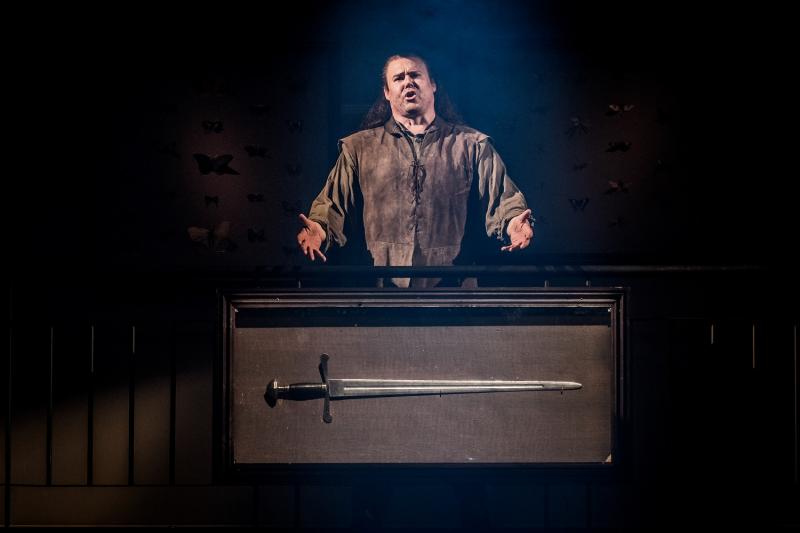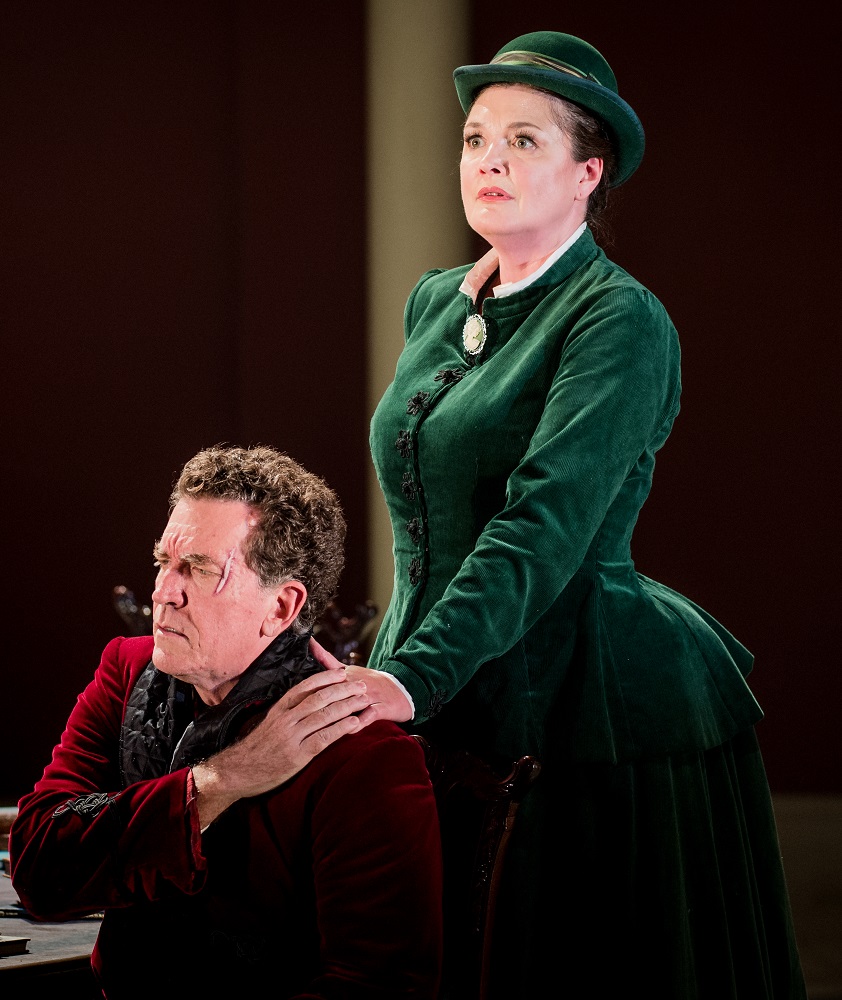Die Walküre, Grange Park Opera review - imaginative and intelligent | reviews, news & interviews
Die Walküre, Grange Park Opera review - imaginative and intelligent
Die Walküre, Grange Park Opera review - imaginative and intelligent
Wagner’s epic shines in compelling staging with strong cast

Grange Park Opera is aiming big. The company is in a new venue, the grounds of West Horsley Place in Surrey, where they have built themselves a spectacular new opera house in less than a year. The building is not yet complete, but is close enough to stage a full summer season, including this new production of Die Walküre, the second opera of Wagner’s Ring cycle.
It’s a single-set affair – a large balconied room of a stately home. But set designer Jamie Vartan and lighting designer David Plater create so much variety that it is easy to forget that there are only minimal prop changes between the acts. Director Stephen Medcalf focuses on the narcissism, even sadism, that leads Hunding to exploit Sieglinde, and Wotan to exploit Brünnhilde, the connection apparent in the shared visual style between the first two acts. Medcalf is comfortable with the incongruity of Hunding’s home in the first act becoming Wotan’s in the second. Both are collectors, Hunding a Victorian naturalist, his home filled with glass cabinets of stuffed animals, Wotan of military regalia. Even the sword Nothung sits in a glass display case, and of course Sieglinde and Brünnhilde are similarly treated as trophies.
All these ideas are secondary to the sheer theatricality of the staging
Medcalf adds a mute subplot, a relationship between the butler and a chambermaid, again mirroring the two abusive relationships. If you don’t like that sort of directorial addition, you can usually ignore it, but not here. In the second act it descends into graphic sexual violence, enacted in the background as Wotan sings. Callous? Perhaps, but it works perfectly as the focal point for Medcalf’s interpretation; it is very difficult to see Wotan as the hero here.
All these ideas are secondary to the sheer theatricality of the staging, and the greatest strength of the production is the Personenregie, Medcalf continually drawing imaginative, often counterintuitive, reactions from the characters. The chemistry between the Siegmund and Sieglinde in Act I isn’t easy to express, but here the gradual emergence of their love is palpable. Similarly with the gradual acceptance of Brünnhilde’s fate in the finale, expressed to us with increasing certainty through the hardening interactions between her and Wotan. But the uncertainty of individual characters is even more compelling. The Annunciation of Death scene in Act II is a highlight, with Brünnhilde initially uncertain and reluctant to do her duty, and Siegmund similarly divided, although the moment of his resolve is sharply defined.
The standout performance in Act I is from Claire Rutter as Sieglinde. Her tone is pure and clear, and her German articulation impeccable. Bryan Register, as Siegmund (main picture), seems to hold back initially, but his vocal prowess soon becomes clear. Wälse! Wälse! Wo ist dein Schwert? was sensational, and the finale of Act I makes a similar impact. Alan Ewing is bassy and forceful, although there was a curious nasal quality to his tone, perhaps the result of a head cold. A shame, because his portrayal of the patient but vengeful Hunding is dramatically ideal.
 Act II takes place around a huge circular table, with Wotan the Lord of the Manor and Fricka an upright and pompous visiting Victorian lady, bustle and all. The dynamic between Thomas Hall’s Wotan and Sara Fulgoni’s Fricka (both pictured right) is excellent, Wotan attempting to play down the Wälse affair, as if it was simply a business matter, while Fricka continually insists on the moral implications. Hall is a lean figure, and his voice is not huge, but he has the ideal stage presence for the role, and his portrayal of Wotan is the key note of this production – strong and authoritative, but fatally compromised in every situation. Fulgoni is similarly compelling as Fricka, although a little less clear in articulation.
Act II takes place around a huge circular table, with Wotan the Lord of the Manor and Fricka an upright and pompous visiting Victorian lady, bustle and all. The dynamic between Thomas Hall’s Wotan and Sara Fulgoni’s Fricka (both pictured right) is excellent, Wotan attempting to play down the Wälse affair, as if it was simply a business matter, while Fricka continually insists on the moral implications. Hall is a lean figure, and his voice is not huge, but he has the ideal stage presence for the role, and his portrayal of Wotan is the key note of this production – strong and authoritative, but fatally compromised in every situation. Fulgoni is similarly compelling as Fricka, although a little less clear in articulation.
The second half of Die Walküre relies mostly on Wotan and Brünnhilde, and the combination of the Thomas Hall and Jane Dutton again proves close to ideal. Dutton isn’t on the very highest rank of Wagnerian voices, but she is more than proficient, and her acting is superlative. She has all the top notes, although they don’t always sound natural, and her voice audibly tired in the last act. A shout-out, too, for Brünnhilde’s fellow Valkyries. At the opening of Act III, they are presented as yet more specimens in Wotan’s collection, each on display in a glass cabinet, before coming to life for a menacing war dance – all attired in Prussian military uniform, pointy helmets and all. The ensemble is in fine vocal form, their Hojotohos ringing around the small auditorium.
The Bournemouth Symphony Orchestra copes well with the huge demands of Wagner’s score. The woodwind soloists shone, particularly the bass clarinet. The brass occasionally sounded stretched, especially the horns in the first act, and the lower brass could do with a little more weight. Conductor Stephen Barlow leads a patient but suitably dramatic and fluid musical interpretation. He gives plenty of space to the singers, and paces the music to the action. So the quiet pedal points are often daringly extended to allow time for the stage action, while all the set pieces – the Act I finale, the Ride of the Valkyries – are properly driven for full dramatic impact.
This Walküre follows a well-received Tristan und Isolde, which was in the company’s repertoire at its previous home until last year. When that was first unveiled, in 2011, there was talk from the management of a Ring cycle, or at least several instalments. This new production augers well for the company’s Wagnerian ambitions, which no doubt will continue apace when their own Valhalla is complete.
Add comment
The future of Arts Journalism
You can stop theartsdesk.com closing!
We urgently need financing to survive. Our fundraising drive has thus far raised £49,000 but we need to reach £100,000 or we will be forced to close. Please contribute here: https://gofund.me/c3f6033d
And if you can forward this information to anyone who might assist, we’d be grateful.

Subscribe to theartsdesk.com
Thank you for continuing to read our work on theartsdesk.com. For unlimited access to every article in its entirety, including our archive of more than 15,000 pieces, we're asking for £5 per month or £40 per year. We feel it's a very good deal, and hope you do too.
To take a subscription now simply click here.
And if you're looking for that extra gift for a friend or family member, why not treat them to a theartsdesk.com gift subscription?
more Opera
 Falstaff, Glyndebourne review - knockabout and nostalgia in postwar Windsor
A fat knight to remember, and snappy stagecraft, overcome some tedious waits
Falstaff, Glyndebourne review - knockabout and nostalgia in postwar Windsor
A fat knight to remember, and snappy stagecraft, overcome some tedious waits
 Salome, LSO, Pappano, Barbican review - a partnership in a million
Asmik Grigorian is vocal perfection in league with a great conductor and orchestra
Salome, LSO, Pappano, Barbican review - a partnership in a million
Asmik Grigorian is vocal perfection in league with a great conductor and orchestra
 Semele, Royal Opera review - unholy smoke
Style comes and goes in a justifiably dark treatment of Handelian myth
Semele, Royal Opera review - unholy smoke
Style comes and goes in a justifiably dark treatment of Handelian myth
 Le nozze di Figaro, Glyndebourne review - perceptive humanity in period setting
Mostly glorious cast, sharp ideas, fussy conducting
Le nozze di Figaro, Glyndebourne review - perceptive humanity in period setting
Mostly glorious cast, sharp ideas, fussy conducting
 Fidelio, Garsington Opera review - a battle of sunshine and shadows
Intimacy yields to spectacle as Beethoven's light of freedom triumphs
Fidelio, Garsington Opera review - a battle of sunshine and shadows
Intimacy yields to spectacle as Beethoven's light of freedom triumphs
 Dangerous Matter, RNCM, Manchester review - opera meets science in an 18th century tale
Big doses of history and didaction are injected into 50 minutes of music theatre
Dangerous Matter, RNCM, Manchester review - opera meets science in an 18th century tale
Big doses of history and didaction are injected into 50 minutes of music theatre
 Mazeppa, Grange Park Opera review - a gripping reassessment
Unbalanced drama with a powerful core, uninhibitedly staged
Mazeppa, Grange Park Opera review - a gripping reassessment
Unbalanced drama with a powerful core, uninhibitedly staged
 Saul, Glyndebourne review - playful, visually ravishing descent into darkness
Ten years after it first opened Barrie Kosky's production still packs a hefty punch
Saul, Glyndebourne review - playful, visually ravishing descent into darkness
Ten years after it first opened Barrie Kosky's production still packs a hefty punch
 Così fan tutte, Nevill Holt Festival/Opera North review - re-writing the script
Real feeling turns the tables on stage artifice in Mozart that charms, and moves
Così fan tutte, Nevill Holt Festival/Opera North review - re-writing the script
Real feeling turns the tables on stage artifice in Mozart that charms, and moves
 La Straniera, Chelsea Opera Group, Barlow, Cadogan Hall review - diva power saves minor Bellini
Australian soprano Helena Dix is honoured by fine fellow singers, but not her conductor
La Straniera, Chelsea Opera Group, Barlow, Cadogan Hall review - diva power saves minor Bellini
Australian soprano Helena Dix is honoured by fine fellow singers, but not her conductor
 The Queen of Spades, Garsington Opera review - sonorous gliding over a heart of darkness
Striking design and clear concept, but the intensity within comes and goes
The Queen of Spades, Garsington Opera review - sonorous gliding over a heart of darkness
Striking design and clear concept, but the intensity within comes and goes
 The Flying Dutchman, Opera Holland Park review - into the storm of dreams
A well-skippered Wagnerian voyage between fantasy and realism
The Flying Dutchman, Opera Holland Park review - into the storm of dreams
A well-skippered Wagnerian voyage between fantasy and realism

Comments
Gavin, the 'servants' of the
The set was clearly inspired